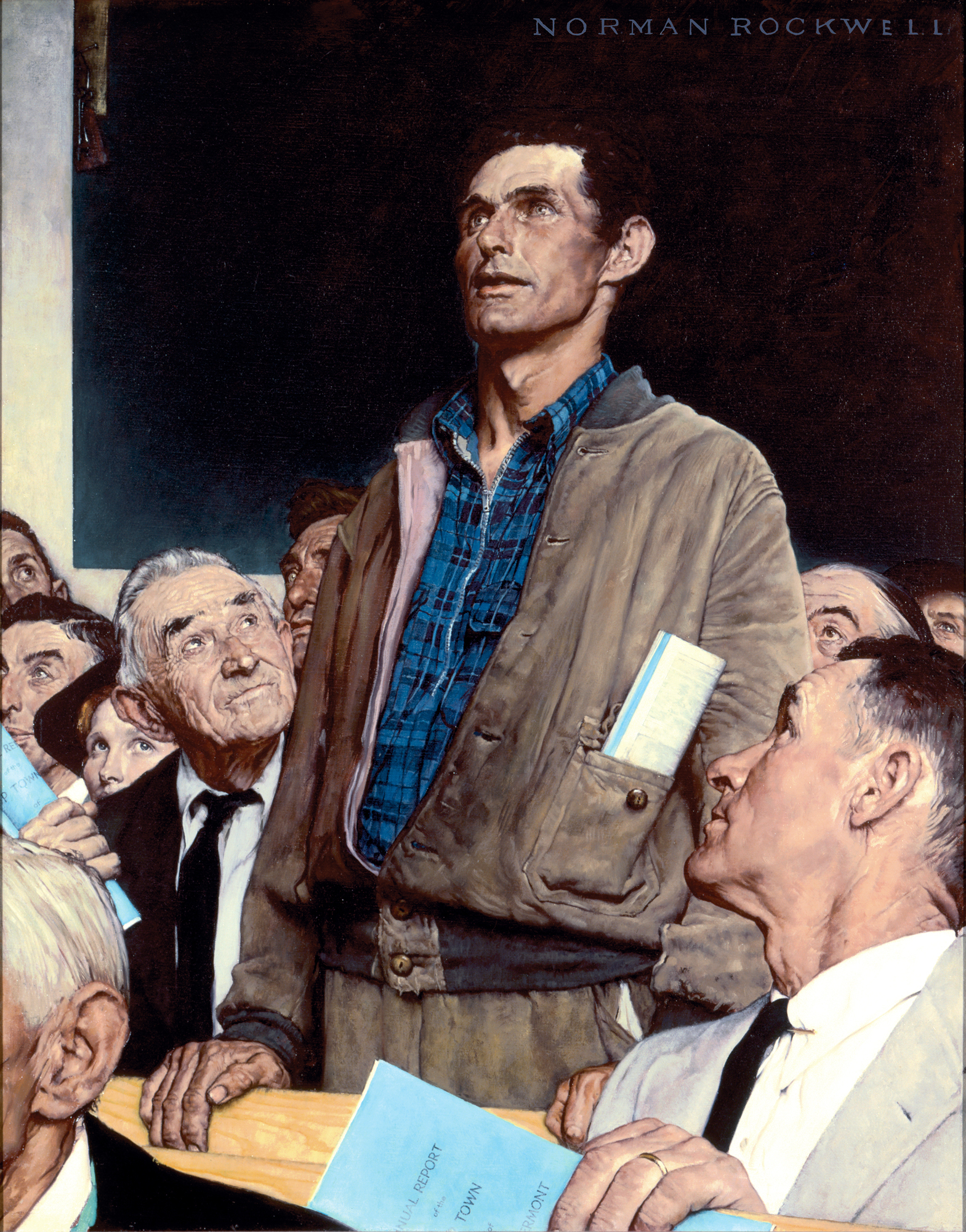 |
| Norman Rockwell, Four Freedoms |
- Popular saying derived Supreme Court Justice Louis Brandeis' 1927 opinion in Whitney v. California, "If there be time to expose through discussion the falsehood and fallacies, to avert the evil by the processes of education, the remedy to be applied is more speech, not enforced silence."
"We must make our choice. We may have democracy, or we may have wealth concentrated in the hands of a few, but we can't have both."
- Louis Brandeis, also
Apple made news the yesterday as the first company valued at a trillion dollars. Tennessee also held its primaries Thursday, setting the slate for the fall elections. These events have more in common than just taking place on the same day.
I don't have anything specifically against Apple. It's more about what the company now represents as one of the richest companies in the world -- a massive amount of money controlled by relatively few people. Apple supports some things I agree with -- gay rights, net neutrality and more open immigration laws. They also lobby for massive tax breaks that result in me paying a greater percentage of my income in taxes than Apple does on its profits.
It's the principle of who has the ability to be heard in our democracy. Plenty of corporations support some things I like. Many others don't. All well and good, except that we aren't on an even playing field.
Thanks to Citizens United, Apple and other corporations have the same right to free speech as you and I do. Since one way we interpret political speech is to make money = speech, Apple (and other gargantuan enterprises, mega-wealthy individuals, or exists-only-on-paper shell companies that could, among other things, hide foreign contributions) are free to contribute unlimited amounts in order to sway voters.
Sure, any of us are also constitutionally free to form or contribute to the same dark money groups, but it's not likely that you or I are ever worth a trillion dollars.
And that's the thrust of the issue.
***
Louis Brandeis' famous argument against overly limiting political speech is cited at the top of this post. It's a sentiment I generally support regarding content of speech. One of the greatest virtues of this country is the incredible latitude to say what one wants.
But as a practical matter, not all speech is treated the same. Money can amplify speech in ways that weren't imaginable in Brandeis' day. Now, a little less than a century later, many more incredibly rich companies and people vying to influence the world's richest and most influential government. This is why we should return to laws that constrain money's power to act as a force multiplier for certain types of speech.
We have limited bandwidth. I, like every other voter, can pay attention to only a few things in a given day. Spouse, children, how am I going to eat, job, ESPN....there's a lot of stuff on the list before one gets to politics. And I'm a political news obsessive! People with far healthier news diets go entire day -- weeks! -- without thinking much about politicians and their machinations. (This is a good thing. One of the under-appreciated luxuries of living in a stable democracy is the ability to occasionally tune out. Sadly, not the era we live in now.)
What unlimited and unchecked amounts of money allow is to fill up our bandwidth with noise. One effect of the bazillion negative ads we'll see and hear until November 6 is that they crowd out other speech. Not only are advertising slots on TV, radio, and Facebook limited, our attention span can only take so much.
One of the more effective ways to shut up speech you don't like is to deny others the ability to hear and process it.
***
Among other results from Tennessee's primaries, Phil Bredesen and Marsha Blackburn are now officially set to square off to be the state's junior senator. The winner of the election may determine which party controls the U.S. Senate. Obviously, much rides on whether Mitch McConnell remains the second-most powerful person in government. Perhaps longest-lasting impact will come from whether far-right conservatives or moderates make up a good chunk of the judiciary for the next three to four decades.
The judges appointed in the next few years will likely either be able to build on the Citizens United decision or curtail its excesses in our lifetimes. Another way to think about is that our government will decide how much average citizens' voices can be shouted down or filibustered by the mega-wealthy.
Though it's hard to discipline our attention spans, we should pay attention to this.
No comments:
Post a Comment